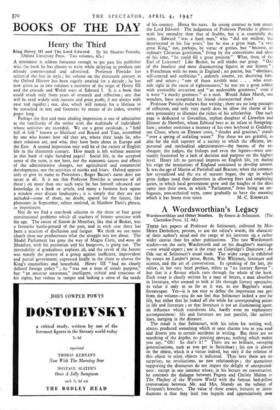BOOKS OF THE DAY
Henry the Third
King Henry III and The Lord Edward. By Sir Maurice Powicke. (Oxford University Press. Two volumes, 42s.)
A HISTORIAN is seldom fortunate enough to get past his publisher with the book he has chosen to write while delaying to produce one already commissioned and advertised. Professor Powicke has achieved the feat in style ; his volume on the thirteenth century in the Oxford History has been eagerly awaited for a decade ; he has now given us in two volumes a narrative of the reign of Henry III and the crusade and Welsh wars of Edward I. It is a book that could result only from years of research and reflection ; one that will be read widely with interest and great profit, if not always with ease and rapidity ; one, also, which will remain for a lifetime to be consulted in text and footnotes by means of its index, seventy pages long. Perhaps the first and most abiding impression is one of admiration at the familiarity of the writer with the multitude of individuals whose activities are recorded. We see a great cavalcade, a "field full of folk" known to Maitland and Round and Tont, assembled by one who knows how old they are, where their lands lie, who their relations are, and whar they have been about in Europe' and the East. A second impression may well be of the variety of English life in the thirteenth century. How much is left without mention in this -book of eight hundred pages! Social life, in the accepted sense of the term, is not here, nor the economic causes and effects of the administrative changes, nor agricultural and commercial developments, nor the activities of monks and friars. Oxford appears only to give its name to Provisions ; Roger Bacon's name does not occur at all. It is not that Professor Powicke is unaware of all these ; on more than one such topic he has himself advanced our knowledge in a book or article, and many a footnote here opens a window over distant landscapes ; it is simply that they are not included—some of them, no doubt, spared for the future, like pheasants in September, others omitted, in Matthew Paris's phrase, as impertinent. Nor do we find a text-book solution to the three or four great constitutional problems which all teachers of history associate with the age. The career of Simon de Montfort, like that of Becket, was a favourite battle-ground of the past, and in each case there has been a reaction of disillusion and fatigue. We think we see more clearly than our predecessors what the struggle was not about. The Model Parliament has gone the way of Magna Carta, and cow de Montfort, with his patriotism and his burgesses, is going too. The inevitability of gradualness explains all, and the revolt of the barons was merely the protest of a group against inefficient, improvident and partial government, expressed finally in the claim to choose the King's counsellors and household. Henry HI "had no clearly defined foreign policy " ; he "was not a man. of steady purpose," but "an amateur statesman," intelligent, critical and tenacious of his rights, but violent in temper and lacking a sense of the needs of his country. Hence his tears. In strong contrast to him stands the Lord Edward. The judgement of Professor Powicke is phrased with less rotundity than that of Stubbs but it is essentially the same. Edward "was a hard man," who "did not mellow, but deteriorated in his last years," but he was a great man "a very great King," not, perhaps, by virtue of genius, but "because, an ordinary Christian gentleman," living by the conventions and ideas of his time, "he could fill a great position." What, then, of the Earl of Leicester? Like Becket, he still eludes our grasp. "One of the loneliest and most disconcerting figures in our history" ; a Frenchman with no roots in England ; no patriot, but "obstinate, self-centred and ambitious"' ardently sincere, yet deceiving him- self and others ; "one of those terrible men . . . who over- ride right in the cause of righteousness," he was yet a great soldier with irresistible attraction and "an updeniable greatness," even if it were "a murky greatness" as a man. Would Adam Marsh, one wonders, have recognised his friend characterised thus?' Professor Professor Powicke eschews fine writing ; there are no long passages of reflection and only very rarely does he allow the charm of his own personality to illumine the riches of his scholarship. One such page is dedicated to Gwenllian, orphan daughter of Llewelyn and Eleanor de Montfort, whom Edward bore as an infant to Sempring- ham ; another enshrines a memory of his own boyhood in Gedding- ton Chase, where an Eleanor cross, "slender and gracious," stands "over a. spring of unfailing water." For these we are grateful, as also for the rich tapestry of a society in which the efficient, im- personal and methodical administrators—the barons of the ex- chequer, the judges, the bishops and even the legates—were con- stantly frustrated by a lack of -decision and purpose on the highest level. Henry left no personal impress on English life, yet during his reign the institutions of England continued to develop unseen. It was the age of Martin of Pattishall ad Bracton, when the common law crystallised and the era of statutes began, the age. in which great judges used their discretion in allowing fines and employing juries, in which local government grew and the knights of the shire came into their own, in which "Parliament," from being an am- biguous, non-technical term, came gradually to have the meaning


































 Previous page
Previous page